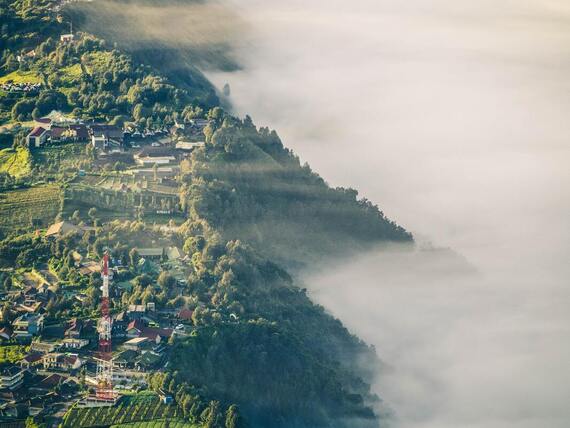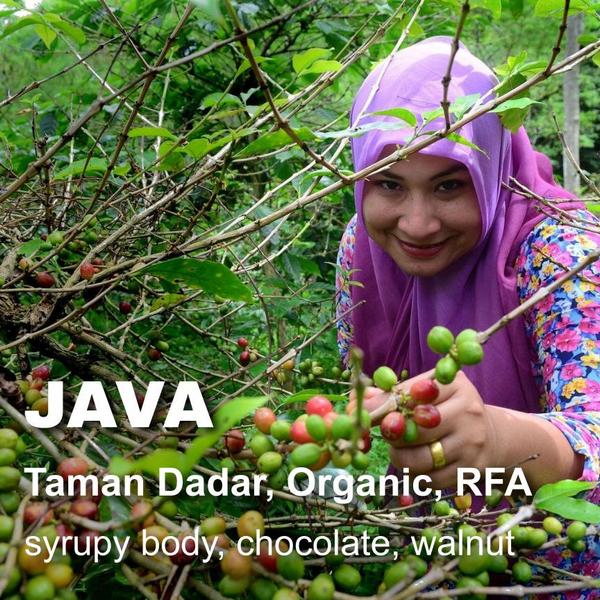- NOW IN STOCK!
- >
- Java
Java
SKU:
$6.75
6.75
138
$6.75 - $138.00
Unavailable
per item
Taman Dadar, Organic, Rain-Forest certified
About the coffee
- Cupping notes: With mild acidity and a heavy, syrupy body, this organic Java is clean but complex; rich in character with a notes of dark chocolate, black pepper, and molasses. Its bold presence has a lingering aftertaste of smooth herbal notes.
- Altitude: 3,000-5,200 feet
- Tree type: Mostly Typica
- Preparation: Wet-hulled, fermented, washed, sun-dried
About the people who grow it
 Top: Taufik Abdullah, pixabay.com
Top: Taufik Abdullah, pixabay.comBottom: Waranont, unsplash.com
Coffee has been cultivated on the Island of Java since the late 1600's; the first Dutch sailing ships carrying coffee back to Europe can be traced back to 1711. Most of the trees in Java at this time were planted in low lying areas and by the late 1800's had become infested with coffee rust, a defoliant disease that thrives at lower altitudes due to the warmer climate. It forced production up to the highlands, where volcanic soil and higher altitudes lay the groundwork for a much better cup.
The vast majority of coffee production on Java is controlled by the Indonesian government estates (any coffee called “Estate Java” falls into this category). However, there are smallholder farmers on the Ijen Plateau in eastern Java who operate independently. This “Taman Dadar” coffee (meaning flower garden, as the local farmers call this area), comes from the villages of Curah Tatal and Kayumas. The most common varietal grown in this area is a Typica hybrid that is also very common in Toraja, Sulawesi. This high-altitude coffee has been organic for generations. Just this season, these farmers have been certified Organic by the Control Union, allowing them to receive a premium for their coffee.
While the government estates practice monocultural farming, the Taman Dadar farmers intersperse Erythrina, Albizia and Leucaena trees for shade and as a source of food for their livestock (which in turn supply the fertilizer). While the government estates practice fully-washed processing, Taman Dadar coffee is processed using the “wet-hulled” method, removing the outer skin of the red cherries by pulping machine in the late afternoon or evening, then put into fermentation tanks for 24 – 36 hours. After washing, the clean parchment is sun-dried on bamboo mats for about 8 hours until it reaches 35 % moisture content. At this stage, the exporter will buy the wet parchment and hull it before final drying down to 12-15%.
The vast majority of coffee production on Java is controlled by the Indonesian government estates (any coffee called “Estate Java” falls into this category). However, there are smallholder farmers on the Ijen Plateau in eastern Java who operate independently. This “Taman Dadar” coffee (meaning flower garden, as the local farmers call this area), comes from the villages of Curah Tatal and Kayumas. The most common varietal grown in this area is a Typica hybrid that is also very common in Toraja, Sulawesi. This high-altitude coffee has been organic for generations. Just this season, these farmers have been certified Organic by the Control Union, allowing them to receive a premium for their coffee.
While the government estates practice monocultural farming, the Taman Dadar farmers intersperse Erythrina, Albizia and Leucaena trees for shade and as a source of food for their livestock (which in turn supply the fertilizer). While the government estates practice fully-washed processing, Taman Dadar coffee is processed using the “wet-hulled” method, removing the outer skin of the red cherries by pulping machine in the late afternoon or evening, then put into fermentation tanks for 24 – 36 hours. After washing, the clean parchment is sun-dried on bamboo mats for about 8 hours until it reaches 35 % moisture content. At this stage, the exporter will buy the wet parchment and hull it before final drying down to 12-15%.
